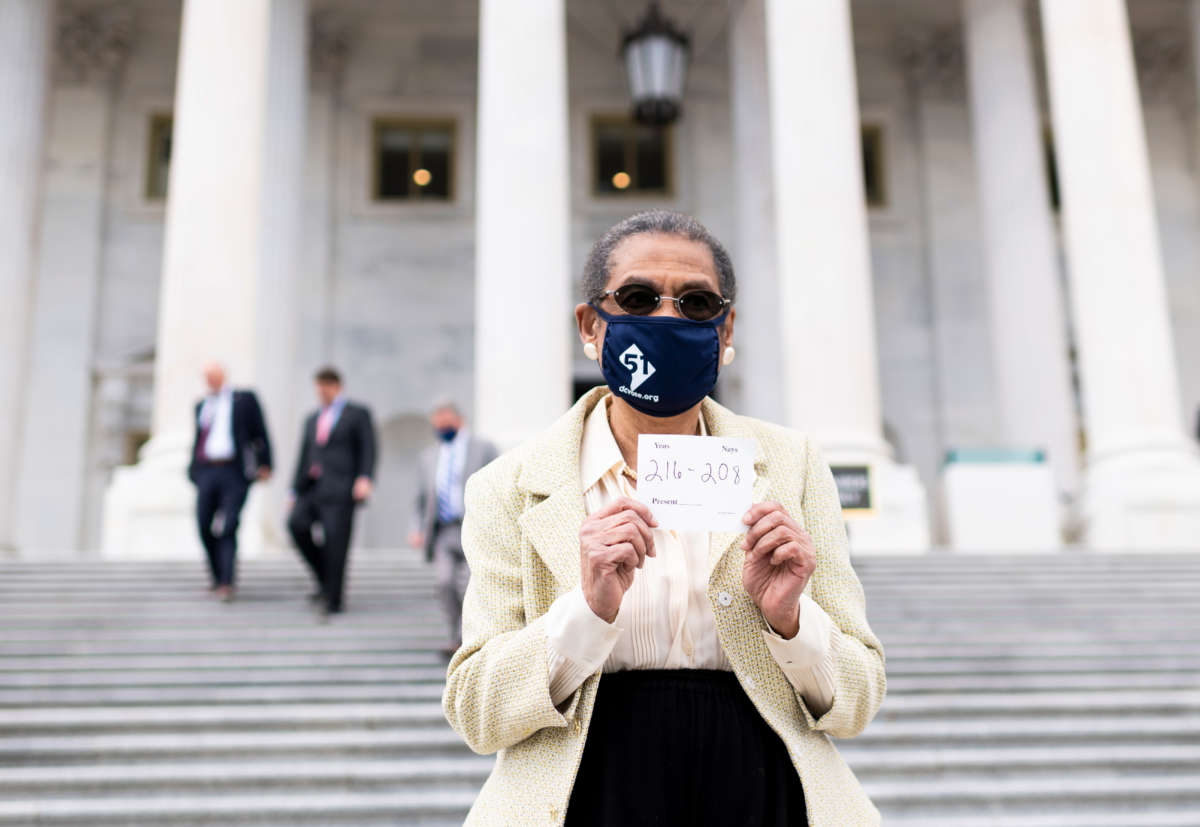On Thursday, the House of Representatives passed a bill that would make Washington, D.C., the 51st state. This is the second time in history that the House has passed D.C. statehood, and the passage grants momentum to Democrats who hope for representation and justice for the area with a large proportion of Black residents.
The Washington, D.C. Admission Act, or H.R. 51, passed 216 to 208 on a party-line vote. Everything except the strip of land including the national mall, White House, Capitol and Supreme Court would be included in the new state.
The bill faces long odds of passing the Senate, where the filibuster quashes Democrats’ majority rule and any hopes that the region might become a state, for now. Republicans are staunchly opposed to granting D.C. statehood, fearing that the Democratic-leaning area would give Democrats more votes in Congress.
The district is home to over 700,000 people, making it more populous than Wyoming or Vermont. If it were granted statehood, D.C. would be the state with the highest proportion of Black residents, with a 46 percent Black population.
The bill’s passage comes after the White House officially logged its endorsement of granting statehood to the region on Tuesday. “The Administration strongly supports H.R. 51, the Washington, D.C. Admission Act,” read a statement from the Office of Management and Budget. “For far too long, the more than 700,000 people of Washington, D.C. have been deprived of full representation in the U.S. Congress.”
The region’s slogan has long been “taxation without representation” — it’s been on the region’s license plates since 2000 — as the residents don’t have voting representation in Congress, despite paying the highest per capita federal income taxes.
Despite Senate Republicans’ opposition, the proposal is now closer to passing than ever. If the filibuster is abolished, as progressive activists, Senate Democrats and House Democrats are pushing for, statehood for D.C. could very well become a reality.
The region’s non-voting congressional delegate, Democrat Eleanor Holmes Norton, has been trying to get statehood for the region passed for the last 30 years.
“My service in Congress has been dedicated to achieving equality for the people I represent, which only statehood can provide,” Norton said in a press conference on the bill on Wednesday. “My life as a third-generation Washingtonian has marched toward this milestone mindful that my own family has never known equality in our country,” said Norton, who is Black.
Advocates of statehood say that the issue is about racial justice. The battle against statehood for D.C., which was majority Black until 10 years ago, has been fraught with anti-Black racism.
“In the Senate today, there are only three Black senators and not a single Black woman in the entire body. The structure of the Senate gives disproportionate power to small, predominantly white states,” said Rep. Ayanna Pressley (D-Massachusetts) during a hearing last month. “In the midst of our national reckoning on racism … uplifting Black political power must be a part of the conversation. We cannot allow electoral justice for the people of Washington DC to be denied any longer.”
D.C. Mayor Muriel Bowser celebrated the bill’s passage on Thursday. “We know well the grave injustices our nation was built on. We also know that progress has been made time and again because elected leaders and everyday citizens had the courage and vision to demand a more inclusive democracy,” said Bowser in a statement. “Today, every member of the House of Representatives who voted in favor of DC statehood made the decision to believe in a stronger, more inclusive Democracy.”
The last time the House passed a bill granting D.C. statehood was in 2020 when it also passed along party-line votes with no Republicans in favor. Some Democrats, in the face of Republican opposition and the roadblock of the filibuster in the Senate, have called for an end to the filibuster so that D.C. can become a state.
“The House just passed D.C. statehood. Republicans will block it in the Senate. In order for D.C. to become the 51st state, we need to end the filibuster,” wrote Rep. Cori Bush (D-Missouri) on Twitter.
Join us in defending the truth before it’s too late
The future of independent journalism is uncertain, and the consequences of losing it are too grave to ignore. To ensure Truthout remains safe, strong, and free, we need to raise $43,000 in the next 6 days. Every dollar raised goes directly toward the costs of producing news you can trust.
Please give what you can — because by supporting us with a tax-deductible donation, you’re not just preserving a source of news, you’re helping to safeguard what’s left of our democracy.
